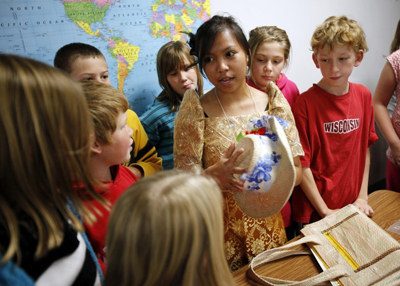Abdulaziz reflects on the highlights from serving as a mentor for CEW.
STORIES
Muslim Exchange Student Promotes Intercultural Understanding

Photo: Kae answers questions from Poynette Elementary School students during a presentation on her faith and culture.
This article was originally published in the Wisconsin State Journal
By Doug Erickson, Wisconsin State Journal
POYNETTE — Kae Fernandez, a foreign exchange student from the Philippines, was giving a talk to a group of elementary children and responding to familiar questions — "Have you ever seen snow?" "Do you have a McDonald's there?" — when the topic turned serious.
"What do you say when you pray?" asked Amelia Pickarts, 9, a fourth-grader at Poynette Elementary School.
Fernandez, 16, who is Muslim, said later she was caught a little off guard by the specificity of the question but pleased it was asked. It cut right to the reason she's here.
Since August, Fernandez has been attending Poynette High School through a U.S. State Department program begun after Islamic extremists attacked the country on Sept. 11, 2001. The program aims to promote intercultural understanding.
Fernandez, chosen through a competitive process, is one of 750 students from 39 countries with significant Muslim populations studying at U.S. high schools this academic year through the program, 47 of them in Wisconsin. Her travel costs are covered by the program, and she receives $125 per month for living expenses. She is staying with a host family, Tom and Vicky Leiterman of Poynette.
In Poynette, where Fernandez is a senior, she is thought to be the only Muslim among the 1,100 students in the district. The situation has matured her, she said, forcing her to tackle tough topics.
"I know some people think all Muslims are terrorists, which is so sad," she said. "I actually ask some students, 'Do you think I'm a terrorist?' They say I'm too nice to be one."
At an orientation this summer, Fernandez said program officials told the Muslim students to be prepared for pointed questions around Sept. 11, especially this year, the 10th anniversary of the attacks. Fernandez was 6 when the attacks occurred and does not remember them. Learning about them as an older student, "I got a sick feeling in the pit of my stomach," she said.
No one gave her a hard time on Sept. 11, she said. She openly discusses the terrorist attacks with fellow students.
"I tell them killing someone is a really big sin as a Muslim," she said. "It's like with Christians. There are good ones and bad ones."
Government teacher Brian Visger said Fernandez's willingness to be so visible and approachable has shed a positive light not just on Islam but on all people who may be considered racially or ethnically different.
"I think it teaches our kids a valuable life lesson, that people are just people," he said.
The Leitermans, who attend a Catholic church, hosted a Muslim student from Pakistan last year through the same program. The student had a positive experience, and, by being the first, probably eased the way some for Fernandez, said Vicky Leiterman, a library assistant at Poynette High School.
Poynette has a history of embracing foreign exchange students, and that's been the case with Fernandez. She was added to the homecoming court this fall as a non-elected member, and she will get her own page in the school yearbook.
"People have been really nice to me, in and out of school," Fernandez said. "If I'm by myself at a cafeteria table, people will invite me to sit with them. They don't let me eat alone."
Fernandez competed in cross country this fall and plays on the school curling team. She has set a steep goal of completing 400 hours of community service while in the U.S.
"Here's a young woman halfway around the world, who left her family and knows no one here, yet she's made a really good go of it," said Matt Shappell, high school principal. "I think that helps our students see you can take on challenges and overcome them successfully."
Fernandez has given eight presentations on her faith and country to students and community members, and she plans more. In answering the fourth-grader's question, she explained that Muslims pray five times daily, sometimes in a building called a mosque.
"I always start my prayer the same way," she told the children. "Praise to Allah."





